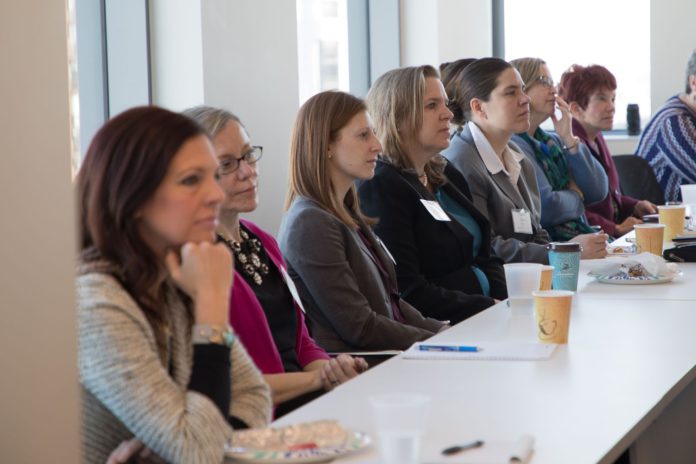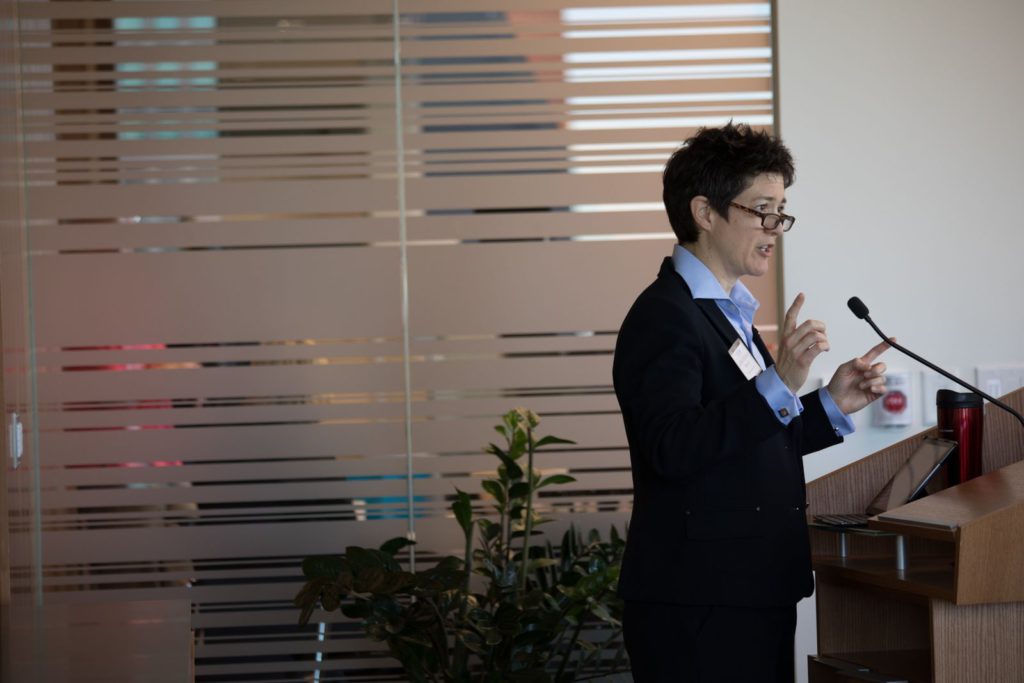
Justice Monica Márquez can remember her dismay that many news headlines focused on her identity as a gay Latina after she received her appointment to the Colorado Supreme Court. But in time, she realized the historical gravity of her appointment and understood she could relate to diverse communities in ways her colleagues could not as effectively. She said she is often asked to speak publicly and has met members of the Latino, LGBTQ and rural communities that way.
“As an ambassador of our legal system, the diversity that I bring as a justice is an asset because I can connect with so many different communities,” Márquez said Tuesday at the CWBA’s Storming the Bench panel discussion, in which she and other female jurists urged women to pursue judgeships. “I get to see firsthand in their faces what a difference it makes for them to meet a Supreme Court justice who reflects some part of their experience.”
She added she understands she does not fit the archetype of a Supreme Court justice, which has helped her realize the importance of diversity on the bench. It carries extra importance now, during a time when many people seem to have dwindling trust in government institutions, she said.
Including Márquez, 11 female panelists including judges, nominating commission members and Gov. John Hickenlooper’s chief legal counsel, gave some of their top advice for judicial hopefuls.
Márquez and many of the event’s other panelists emphasized the importance of candidates thinking thoroughly about why they want to become judges. She has sat on the 2nd Judicial District’s nominating commission, and she said she often encountered male candidates who saw a judgeship as a natural next step in their careers “just because.”
“From a nominating commissioner’s perspective, candidates with that attitude do not fare well in the nomination process,” Márquez said. “It takes a great deal of introspection. It takes a lot of bravery to put yourself out there.”
She said when former Chief Justice Mary Mullarkey retired in 2010, she didn’t consider applying at first. But members of the Colorado Hispanic Bar Association put the idea in her head, and after what she called “soul searching” about why she might want to be a judge, she chose to apply. Then-Gov. Bill Ritter appointed her to replace Mullarkey.
Márquez said she defines diversity broadly. To her, it can mean having an array of experiences and backgrounds in addition to characteristics such as race, gender or sexual orientation. She acknowledged Colorado’s judiciary does not yet reflect the diversity of the state’s population because the attorney pool it pulls from does not. “I have really come to believe that diversity in the judiciary actually strengthens the rule of law.”
After Márquez spoke, the panelists met with the event’s attendees to provide their top tips about everything from preparing to apply to interviewing with the governor’s office
Preparing to Apply
• Get involved in the legal community to diversify your experiences as much as possible so your application will stand out.
• Your reputation in the legal community matters, so maintain positive relationships with everyone from opposing counsel to jurors and witnesses.
• Choose cases to list on your application that show the breadth of your skills as a lawyer.
• Don’t be shy about selling your accomplishments, even if you’re young.
Judge Bonnie McLean, 18th Judicial District:
“One of the biggest things for me on my resumé … was that I didn’t do just my job.”
Judge Erin Sokol, 4th Judicial District:
“Do get out there and get as much diverse experience as you can, and really connect with the people in the community who are going to help support you through the application process.”
Justice Monica Márquez, Colorado Supreme Court:
“Every encounter that you have ever had … is going to be reflected back on you positively or negatively when you go through this process.”
The Application:
• The first question in an interview for a judge position is always, “Why do you want to be a judge?”
• Don’t get discouraged if you’re not successful the first time — or even first several tries — you apply for a judgeship.
• Put a lot of effort into your application, especially the personal statement and into thinking about why you want to be a judge.
Judge Chris Bachmeyer, 1st Judicial District: “Once you make that move to throw your hat in the ring, it’s kind of like being a used car salesman, and you’re the used car.”
Judge Sheila Rappaport, 2nd Judicial District: “They want to know about you. All of us have been to law school. … Hopefully we’re fairly intelligent. So those things are a given.”

Judicial Nominating Commission
• Make sure your references and other people you list on your application know you’re applying so they’re not surprised by a call from the nominating commission.
• Courtroom experience is imperative in order to give yourself an advantage in applying.
• If you have anything negative in your history, address it honestly instead of brushing it off.
Tina Habas, 2nd Judicial District Nominating Commission: “Consider all the people whose lives you touch in your career, starting now, as somebody that may be able to help you get on the bench. … When you go through this life, if your opponents will respect you and say you had integrity, that’s what I look for.”
Candace Figa, 18th Judicial District Nominating Commission: “Know the culture of your commission, your district, that sort of thing. Know the court you’re applying for.”
Judge PJ Loew, 17th Judicial District: “When you go into the interview, that’s your chance to demonstrate, ‘Here’s what I look like on the bench. Here’s how I can communicate with people. Here’s how I listen to questions.’”
The Denver County Court
• Think carefully about why you want to be a judge in Denver County Court because it operates differently than other courts.
• Answer interview questions concisely in order to demonstrate how you’ll perform as a judge in a high-volume court.
• Reach out to commissioners after the application process has finished if you don’t get the position to find out what you can do better when you apply again for a judgeship.
Beth Doherty Quinn, Denver County Court Nominating Commission: “The people that have done really well in interviews, they’re really kind of in command of the room, and that demonstrates to the commissioners how they would really command the courtroom.”
Judge Olympia Fay: “People will want to know why you want to be on that court, what you know about that court and what you can offer to that court.”
Interviewing with the Governor’s Office
• In comments to the governor about judge candidates, quality matters more than quantity.
• Reasons why a particular candidate does not get a judge position are subtle and often have more to do with others applying than anything wrong with that candidate.
• There is no secret formula to what makes a candidate stand out.
• If you have to apply multiple times for a judgeship, it can help to talk about what you’ve learned in the process before.
Jacki Cooper Melmed, chief legal counsel for Gov. John Hickenlooper: “What we need to know from these comments is what we can’t figure out in 30 minutes.”
— Julia Cardi

